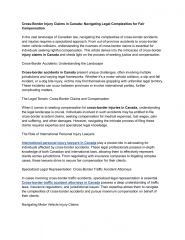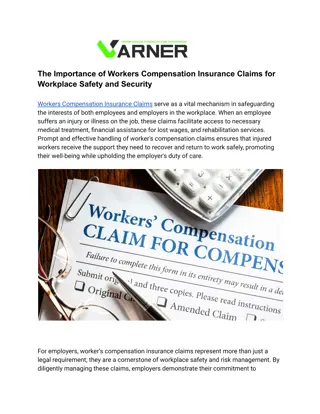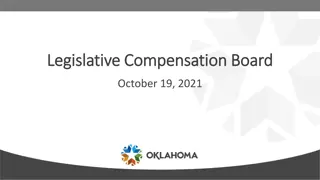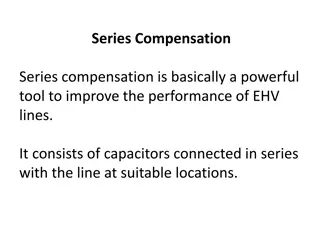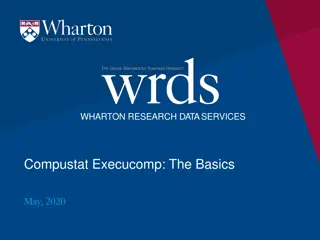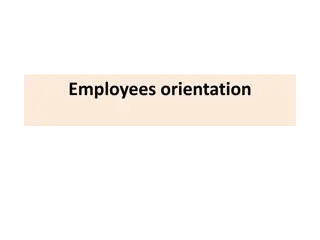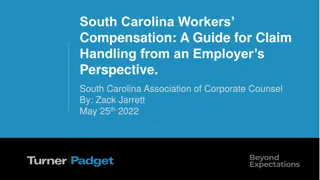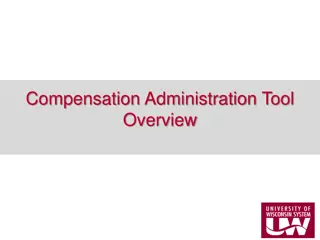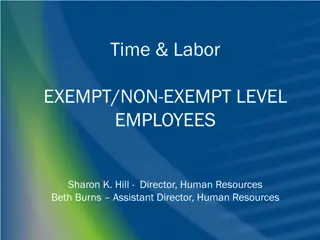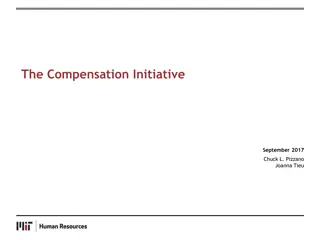Importance of Employee Compensation in HR Management
Employee compensation is a crucial aspect of human resource management, encompassing wages, salaries, and other forms. Properly managing compensation is essential for attracting, retaining, and motivating employees effectively. Chinchu Louis, an Assistant Professor at Nirmala College, Muvattupuzha, provides valuable insights into this field through her work in the Department of Management Studies.
Download Presentation

Please find below an Image/Link to download the presentation.
The content on the website is provided AS IS for your information and personal use only. It may not be sold, licensed, or shared on other websites without obtaining consent from the author. Download presentation by click this link. If you encounter any issues during the download, it is possible that the publisher has removed the file from their server.
E N D
Presentation Transcript
Compensation Management Chinchu Louis Asst Professor Department of Management Studies Nirmala College, Muvattupuzha Department of Management Studies, NCM
Employee compensation is a vital part of human resource management. Wages or salaries and other forms constitute a very large component of operating costs. MAJORITY of the UNION-MANAGEMENT DISPUTES are RELATING TO REMUNERATION. Department of Management Studies, NCM
No organisation can expect to attract and retain talent unless it pays them fair compensation. Compensation Is a motivational factor It helps to satisfy their physical needs It also determines their social status Department of Management Studies, NCM
Employee compensation Base or Primary compensation Supplementary Compensation Incentive Compensation Department of Management Studies, NCM
Base or primary compensation It refers to basic pay in the form of wages and salaries. It is fixed and paid on the basis of time expended on the job. It is usually paid in the form of cash The main purpose is to compensate employees for their services. It is determined on the basis of job evaluation. Department of Management Studies, NCM
Supplementary Compensation It means fringe benefits paid in addition to wages and salaries. The main purpose is to retain employees and to increase their efficiency. It depend mainly on the company policies and needs. Department of Management Studies, NCM
Incentive compensation It refers to monetary compensation paid to employees to motivate them for their performance. It is based on either individual performance or the performance of a group as a whole. Department of Management Studies, NCM
Objectives The main objective of compensation is to ensure fairness or equity. Department of Management Studies, NCM
The term equity has 3 dimensions:- Internal equity:- this ensures that more difficult jobs are paid more External equity:- this ensures that jobs are fiarly compensated in comparison to similar jobs in the labour market. Individual Equity:- it ensures equal pay for equal work Department of Management Studies, NCM
Attract talent:- compensation needs to be high enough to attract talented people. Retain talent:- if the compensation levels falls below the expectations of employees or are not competitive employees may quit in frustration. New and desired behavior:- Pay should reward loyalty, commitment, experience, risk taking etc . If the company fails to do so employees may go in search for greener pastures outside Department of Management Studies, NCM
Control costs:- it ensures that employees are neither overpaid nor underpaid Comply with legal rules:- it must invariably satisfy governmental rules regarding minimum wages, bonus, allowances etc Department of Management Studies, NCM
Components of Pay structure in India Department of Management Studies, NCM
Monetary compensation package of employees generally consists of the following:- 1. Base pay 2. Allowances 3. Incentives 4. Fringe benefits Department of Management Studies, NCM
Base Pay Base pay :- It is the first and foremost part of pay, package, which is determined through JOB EVALUATION. The fair wages committee gave 3 concepts relations to basic wages Minimum Wage Fair Wage Living wage Department of Management Studies, NCM
Minimum Wages The minimum wage may be defined as the lowest wage necessary to maintain a worker and his family at the minimum level of subsistence, which includes food, clothing and shelter. Minimum wage in a country is fixed by the government in consultation with business organisations and trade unions Department of Management Studies, NCM
Fair wage A fair wage is something more than the minimum wages. Fair wage is a mean between the living wage and the minimum wage. While the lower limit of the fair wage must obviously be the minimum wage, the upper limit is the capacity of the industry to pay Fair wage depends on the present economic position as well as on its future prospects. Department of Management Studies, NCM
Living wage According to Fair Wages Committee Report: "The living wage should enable the male earner to provide himself and his family not merely the basic essentials of food, clothing and shelter but a measure of frugal comfort including education for the children, protection against ill-health, requirement of essential social needs and measures of insurance against old age. It is the amount that not only fulfills the basic needs but in addition provides certain ameninties, necessary for the well being of the worker. Department of Management Studies, NCM
Allowances An allowance is an amount received by the employee for meeting service requirements. Allowances are provided in addition to the basic salary and vary from company to company. Some common types of allowances are discussed below: Dearness Allowances House Rent Allowance Leave travel allowance (LTA) Medical Allowance Conveyance Allowance Child Education Allowance Department of Management Studies, NCM
Dearness Allowance Dearness Allowance (DA) was introduced as part of the salary as a means to reduce the burden of inflation on salaried employees. This amount is usually set to about 5% of the total CTC. Department of Management Studies, NCM
House Rent Allowance (HRA) The House Rent Allowance, as the name suggests is a component that employees can leverage if they are living in rented accommodations. The amount that you can claim as tax deduction under HRA cannot be more than 50% of your basic in a metro or 40% of your basic in a non- metro. Hence, depending on where your workplace is located, this salary component will usually be set at 40% or 50% of the basic salary. Department of Management Studies, NCM
Leave travel allowance (LTA) Leave travel allowance (LTA) remunerates employees for their travel within the country. This component is widely used by employers due to the tax benefits associated with it. An employee can claim tax benefits for the fare expenses paid for his/her family when they take a holiday. However, there are restrictions to what you can claim as tax benefits: Only fare expenses are covered: Only the travel fare expenses can be claimed. Stay and food on your trip aren t covered. Travel must be within India: If you travel to a foreign country, the expenses aren t tax deductible. Only travel within the country is covered. What counts as family: Immediate family that are mainly dependant on the employee are covered under LTA. Department of Management Studies, NCM
Child Education Allowance This component is paid out towards tuition fees of employees children and is tax deductible up to Rs. 100 every month for a maximum of two children. Hence, this amount is usually set to not more than Rs. 2,400 a year for an employee. Department of Management Studies, NCM
Incentives Bonus, profit sharing, commission on sales etc are the various forms of incentives and basically they are PERFORMANCE based. Star performers are found out and incentives are given to them. Department of Management Studies, NCM
Fringe Benefits PF, pension, gratuity ect are examples of such benefits. Department of Management Studies, NCM
Wage and Salary Administration Department of Management Studies, NCM
Objectives A sound plan of compensation administration seeks to achieve the following objectives:- To establish a fair and equitable remuneration offering similar pay for similar work. To attract qualified and competent personnel To retain the present employees by keeping wage levels in tune with competing units Department of Management Studies, NCM
To control labour and administrative costs in line with the ability of the organisation to pay To improve motivation and morale of employees and to improve union- management relations. To project a good image of the company and to comply with legal needs relating to wages and salaries Department of Management Studies, NCM
Principles of Wage and Salary Administration 1. Wage and salary plans should be sufficiently flexible 2. Job evaluation must be done scientifically 3. Wage and Salary Administration plans must always be consistent with overall organisational plans and programmes 4. Wage and Salary Administration plans and programmes should be responsive to the changing local and national conditions Department of Management Studies, NCM
Elements of Wage and Salary Administration 1. Identifying the available salary opportunities, their costs, estimating the worth of its members, of their salary opportunities and communicating them to employees. 2. Relating salary to needs and goals 3. Developing quality, quantity and time standards related to work and goals 4. Determining the effort necessary to achieve standards Department of Management Studies, NCM
5. Measuring actual performance 6. Comparing the performance with the salary received 7. Measuring the job satisfaction of the employees 8. Evaluating the unsatisfied wants and unrealised goals aspirations of the employees. 9. Finding out the dissatisfaction arising from unfulfilled needs and unattained goals 10.Adjusting the salary levels accordingly with a view to enabling the employees to reach unreached goals and fulfill the unfulfilled needs and aspirations. Department of Management Studies, NCM
Factors influencing Compensation Levels Department of Management Studies, NCM
Factors influencing Compensation Levels Jobs needs Ability to Pay Cost of Living Prevailing wage rates Unions Productivity State Regulations Demand and Supply of labour Department of Management Studies, NCM
Choices in Designing a compensation system Department of Management Studies, NCM
The compensation system that is followed by a firm should be in tune with its own unique character and culture and allow the firm to achieve its strategic objectives A wide variety of options confront a firm while designing such a system Department of Management Studies, NCM
Internal Pay and External Pay Fixed vs Variable Pay Performance vs Membership Job vs Individual Pay Below market vs above market compensation Open vs Secret pay Department of Management Studies, NCM


